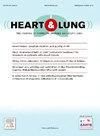Precise Volume Management with CardioMEMS: Effects on Chronic Kidney Disease Progression and Kidney Function Preservation in Heart Failure Patients
IF 2.6
4区 医学
Q2 CARDIAC & CARDIOVASCULAR SYSTEMS
引用次数: 0
Abstract
Background
Heart failure (HF) often coexists with chronic kidney disease (CKD), creating a bidirectional cycle of organ dysfunction that accelerates disease progression. Traditional volume management methods relying on clinical judgment and fixed diuretics can result in suboptimal outcomes. Innovative strategies, such as hemodynamic monitoring with the CardioMEMS Heart Failure Monitoring System, offer potential benefits in slowing CKD progression and preserving kidney function.
Aim
The aim of this retrospective cohort study was to evaluate the impact of strict volume management using CardioMEMS on CKD progression and estimated glomerular filtration rate (eGFR) preservation compared to standard care.
Methods
A total of 100 patients with HF and CKD (Stages 3–4) were included, with 50 receiving CardioMEMS implants and 50 managed through standard care. Data collection occurred at implant or initial hospitalization, 6 months post-implant, and 2 years post-implant. Primary outcomes included changes in eGFR over time and differences between CKD Stage 3 and Stage 4 patients. Statistical analysis was conducted using independent sample tests.
Results
CardioMEMS patients demonstrated significantly better kidney function preservation over 2 years compared to standard care (t98 = 2.798, p = .006). The average eGFR in the CardioMEMS group was 7.56 units higher than the standard care group after 2 years. Patients implanted at CKD Stage 3 showed greater eGFR preservation than those implanted at Stage 4, highlighting the benefits of early intervention.
Conclusions
Strict volume management using CardioMEMS is associated with slower CKD progression and better long-term kidney function preservation in HF patients. Early use of CardioMEMS may shift the standard of care, promoting personalized volume management to improve patient outcomes and delay dialysis. Larger studies are warranted to confirm these findings and refine clinical guidelines.
CardioMEMS的精确容积管理:对心力衰竭患者慢性肾病进展和肾功能保存的影响
心衰(HF)常与慢性肾脏疾病(CKD)共存,形成器官功能障碍的双向循环,加速疾病进展。传统的容量管理方法依赖于临床判断和固定利尿剂可能导致不理想的结果。创新策略,如CardioMEMS心力衰竭监测系统的血流动力学监测,在减缓CKD进展和保护肾功能方面提供了潜在的益处。目的:本回顾性队列研究的目的是评估与标准治疗相比,使用CardioMEMS进行严格容量管理对CKD进展和估计肾小球滤过率(eGFR)保存的影响。方法共纳入100例HF和CKD患者(3-4期),其中50例接受CardioMEMS植入物治疗,50例接受标准治疗。数据收集发生在种植体或初次住院、种植体后6个月和种植体后2年。主要结局包括eGFR随时间的变化以及CKD 3期和4期患者之间的差异。采用独立样本检验进行统计分析。结果与标准治疗相比,scardiomems患者2年肾功能保存明显更好(t98 = 2.798,p = .006)。2年后,CardioMEMS组的平均eGFR比标准治疗组高7.56单位。在CKD 3期植入的患者比在4期植入的患者显示出更大的eGFR保存,突出了早期干预的益处。结论:在心衰患者中,使用CardioMEMS进行严格的容量管理可以减缓CKD的进展,更好地长期保存肾功能。早期使用CardioMEMS可能会改变护理标准,促进个性化容量管理,以改善患者预后并延迟透析。有必要进行更大规模的研究来证实这些发现并完善临床指南。
本文章由计算机程序翻译,如有差异,请以英文原文为准。
求助全文
约1分钟内获得全文
求助全文
来源期刊

Heart & Lung
医学-呼吸系统
CiteScore
4.60
自引率
3.60%
发文量
184
审稿时长
35 days
期刊介绍:
Heart & Lung: The Journal of Cardiopulmonary and Acute Care, the official publication of The American Association of Heart Failure Nurses, presents original, peer-reviewed articles on techniques, advances, investigations, and observations related to the care of patients with acute and critical illness and patients with chronic cardiac or pulmonary disorders.
The Journal''s acute care articles focus on the care of hospitalized patients, including those in the critical and acute care settings. Because most patients who are hospitalized in acute and critical care settings have chronic conditions, we are also interested in the chronically critically ill, the care of patients with chronic cardiopulmonary disorders, their rehabilitation, and disease prevention. The Journal''s heart failure articles focus on all aspects of the care of patients with this condition. Manuscripts that are relevant to populations across the human lifespan are welcome.
 求助内容:
求助内容: 应助结果提醒方式:
应助结果提醒方式:


